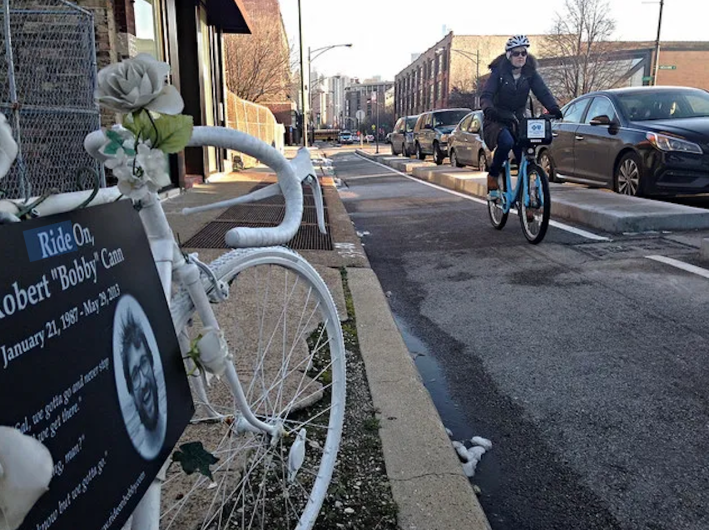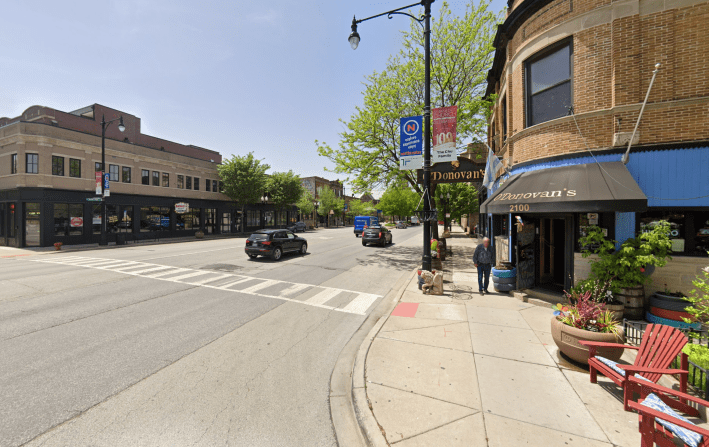One of the biggest barriers to safer streets in Chicago is the Illinois Department of Transportation, which has routinely prevented the Chicago Department of Transportation from making pedestrian and bike safety upgrades on state-jurisdiction streets within the city, out of concerns that they would inconvenience drivers. Tragically, it sometimes takes a high-profile traffic death to make IDOT drop its obstruction of livable street designs.
That was the case with the May 2013 killing of Groupon employee Bobby Cann, 26, by a speeding, intoxicated driver on Clybourn Avenue in Old Town. IDOT had previously been blocking CDOT from installing protected bike lanes on state roads within Chicago like Clybourn for political reasons. But in response to the outcry over Cann's death, the state not only lifted the ban, but collaborated with the city to install curb-protected lanes on Clybourn, which might have helped prevent the fatality in the first place by calming traffic.

Yesterday there was another milestone, as the state and city transportation departments announced that they have reached an agreement that essentially means IDOT will stop vetoing CDOT proposals for safety improvements at the intersections of state- and city-controlled roadways. That's a huge win for livable streets, but sadly it took another tragic crash death, the June 12, 2022 killing of 47th Ward volunteer Peter Paquette, 75, to make IDOT budge on the issue. And remarkably, that collision took place right outside a Chicago tavern where Governor J.B. Pritzker and other politicians had been hanging out.
In 2020, 47th Ward alderperson Matt Martin had proposed pedestrian safety improvements, such as curb extensions and pedestrian islands, on five-lane Irving Park Road, a state-controlled street, in the North Center neighborhood. It's a corridor that includes many destinations with high foot traffic, such as a Brown Line station, schools, parks, and churches, but constituents noted that it's a dangerous and difficult street to cross on foot.
CDOT supported building the pedestrian infrastructure as part of a planned street repaving project. But IDOT officials objected to the pedestrian islands, citing a state regulation that require street designs that make it easy for the drivers of 60-foot semi trucks to make turns to onto state roads. That rule even applies to intersections with quiet residential streets, where such massive trucks shouldn't be driven in the first place.
One such intersection is Irving Park and Hoyne Avenue, where O'Donovan's tavern is located. While there's a marked crosswalk at this location, residents noted it's a dangerous crossing because there's no stoplight. Martin had proposed adding a pedestrian island, which IDOT rejected.
On the day of his death, Paquette and Martin attended the massive Safe Streets for All rally in Lincoln Square, in response to the recent traffic violence deaths of Rafi Cardenas, 2, and Lily Shambrook, 3, in the area. Then the two men headed to O'Donovan's for an early voting event, attended by Governor Pritzker and dozens of other alders and state legislators.

As Paquette was leaving the bar, he attempted to cross Irving Park at Hoyne. That's when a distracted car driver struck him, and the senior was partially thrown through the windshield. He later died from his injuries.
Martin, who was friends with Paquette, tweeted at the time that he was "devastated" by the killing, calling the volunteer "a kind and compassionate spouse, friend, and neighbor – someone who was deeply invested in his family and in our community." The alder promised to "continue working to ensure that future improvements to pedestrian, bike, and public transportation infrastructure —not just throughout our Ward but throughout all of Chicago—are holistic, systemic, and better designed to ensure safe streets for all.”
That's exactly what Martin did, with help from state lawmakers, pushing for IDOT and CDOT to come to the negotiation table to free the city's hands to make crucial safety improvements, a 47th Ward staffer told Streetsblog.
IDOT and CDOT announced the changes yesterday in a joint press release. According to the departments, the Memorandum of Understanding signed by state transportation secretary Omer Osman and CDOT chief Gia Biagi, "establishes preapproval of certain infrastructure designs related to Chicago’s urban street context to improve safety for people walking, biking and driving."
“Today’s MOU builds on our partnership with CDOT and outlines concrete steps that we are taking to address safety, while further enhancing our ongoing collaboration and joint commitment to making roads safer for all users,” said Osman in a statement. “Together, we will continue to work towards our joint goal of zero fatalities and to make Chicago and Illinois roads as safe and accessible as possible.”
The MOU goes into effect immediately and establishes (IDOT's and CDOT's language):
- A standardized list of traffic safety infrastructure designs routinely submitted by CDOT that will not be subject to comprehensive IDOT review prior to installation. This will allow the city to design and self-certify curb cuts and other sidewalk improvements to make streets more walkable and accommodating for nonvehicular traffic, establishes 10-foot-wide vehicular lanes as the minimum lane width.
- Clarified “Design Vehicle” standards to emphasize pedestrian safety at intersections. A design vehicle is the largest vehicle that is likely to use the facility with considerable frequency and its selection can significantly impact a road’s design and geometry. By agreeing to a more appropriate design vehicle for urban streets, certain state routes will be able to add safety features, such as curb extensions and bump-outs that shorten crossing distances for pedestrians.
- An IDOT-CDOT working group to help formulate future agreements and enhance existing interagency collaboration.
Martin heralded the news with the following statement.
In June, my friend Peter was tragically killed by a driver while he walked in a marked crosswalk on Irving Park Rd. Tragedies like this one are preventable, and require that we rethink how we design our streets. While we can never bring back Peter, in the months following his death, I’ve worked diligently with our state colleagues to ensure we systematically change how we approach street design on State routes like Irving Park Road. As a result, CDOT and IDOT have come to an agreement that will give the city more flexibility to prioritize traffic calming, while laying the groundwork for close collaboration to improve safety on dangerous state routes. Thank you to Sen Feigenholtz, Rep Williams, Sen Simmons, and Rep Harris who were all instrumental to facilitating these conversations, and making these changes possible.
While there is more work to do to prevent tragedies like Peter's death, this is an important start. (4)
— Alderman Matt Martin (@AldMattMartin) January 17, 2023
As the alderman tweeted yesterday, further changes will be needed to prevent IDOT from blocking improvements to non-intersection road segments, but this is a big step in the right direction. One immediate improvement we're likely to see in the wake of this change is the installation of the pedestrian islands on Irving Park that IDOT previously rejected, like the one proposed for the intersection where Paquette was killed.

If you appreciate Streetsblog Chicago's livable streets coverage, please consider making a tax-deductible donation to help us raise $50K by 1/31 to fund our next year of reporting. Thank you.





